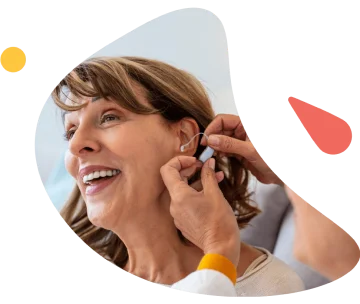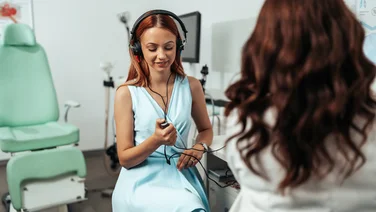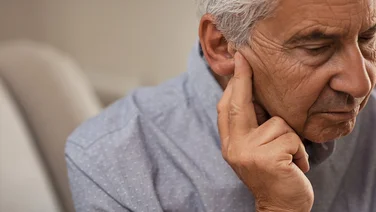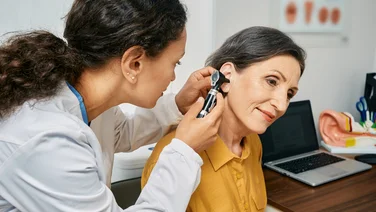Covid-19, caused by the SARS-CoV-2 respiratory virus, has a long list of possible symptoms and complications, most of which are well documented.
We know that many people with Covid-19 experience a loss or change to their sense of taste and smell, but what about hearing?
This page will help answer any questions you may have about Covid-19 and hearing loss, as well as explain some of the research into the possible effects the virus has on the auditory system.
Experiencing hearing loss and want to speak to a trained audiologist?
Can Covid-19 cause hearing loss symptoms?

Many types of viral and bacterial infections are known to affect hearing, such as the common cold and influenza.
Some can even cause complete and irreversible profound hearing loss. So, it would not be surprising if Covid-19 has a negative impact on hearing.
Since the start of the pandemic, there have been reports of people experiencing hearing loss and associated symptoms after contracting Covid-19, notably tinnitus and vertigo.
However, it’s been largely unclear whether Covid-19 directly causes hearing loss and tinnitus, or whether those symptoms occur by chance or because of other factors that could account for the link between the virus and the hearing-related symptoms.
Scientists from around the world have conducted studies to examine the association between Covid-19, hearing loss, and tinnitus, how long they last, and how the virus could cause hearing loss and balance problems.
Prevalence of hearing loss and tinnitus with Covid-19
Scientists in Manchester, UK, reviewed data spanning the beginning of the pandemic to December 2020. Their findings were published in February 2021.
The authors suggested that, among the cases and studies included in their review, 14.8% of people reported having tinnitus, 7.6% reported having hearing loss, and 7.2% had vertigo. These are collectively referred to as audiovestibular symptoms.
The authors acknowledged that their findings may overestimate the prevalence of Covid-related symptoms of hearing loss. This is because of the way some of the studies they reviewed were designed and reported.
They also highlighted that additional high-quality studies were needed to for a clearer understanding of the link between the virus and audiovestibular symptoms.
A year later, researchers in China conducted a similar literature review exploring hearing loss and associated symptoms in people with Covid-19. They found that, among a group of people who reported hearing loss as a symptom, 61% also had tinnitus, 13% had vertigo, 8.7% reported dizziness, and 4% had ear pain.
Just 17.4% reported having hearing loss unaccompanied by any other audiovestibular symptoms.
How does Covid-19 affect hearing and balance?
While research into the prevalence of audiovestibular symptoms of Covid-19 was ongoing, people were unsure of the mechanisms by which the virus affects the ear. A team from Massachusetts, USA, conducted innovative research to find out.
Using adult human inner ear tissue and cellular models of the human inner ear they constructed themselves, they concluded that Covid-19 directly infects cells in the inner ear that are crucial to hearing and balance.
Specifically, the researchers discovered that when Covid-19 enters the inner ear, it can damage or kill off the tiny inner ear hair cells in the cochlear, and the vestibule, found in the central part of the inner ear.
Cochlear hair cells turn sound vibrations into electrical impulses that are sent to the brain, where they are interpreted as sounds. Vestibular hair cells are involved in sending signals to the brain about the body’s position and direction.
When the hair cells in the cochlea are damaged or killed, it results in hearing loss. Likewise, damage to the vestibular hair cells disrupts the sense of balance and can lead to tinnitus and vertigo.
Similarly, when the Covid-19 virus has penetrated the inner ear, it was found to damage cells in the auditory and vestibular nerves, which carry sound and movement information to the brain.
The authors concluded that their findings “begin to build on a causative link between SARS-CoV-2 and audiovestibular dysfunction.”
In other words, the conclusion was that the Covid-19 virus is directly responsible for causing hearing loss and associated symptoms, rather than those symptoms happening simultaneously by chance or because of any other influencing factors.

How long do hearing loss and tinnitus with Covid-19 last?
Until recently, there wasn’t much information available about the duration of Covid-induced tinnitus and hearing loss.
According to the Manchester researchers who explored the prevalence of hearing loss and tinnitus in Covid-19 patients, more than 1 in 10 patients who had been hospitalized with Covid-19 still had persisting hearing loss or tinnitus two months after discharge.
Their data was collected very early on in the pandemic and published in July 2020, and it’s unknown whether any of the patients were followed up beyond the two-month review period.
Another study, this time in Denmark, reviewed patients who had Covid-19 with hearing loss, tinnitus, or both. It followed them for up to 38 weeks after their symptoms first started.
The researchers found that, of the 21 patients with tinnitus, just 7 fully recovered, while 14 experienced partial or no improvement to their symptoms. Among the 17 with hearing loss, only 2 recovered their hearing completely and the remaining 15 still had impaired hearing.
“These symptoms seem to be prolonged in many cases and have substantial consequences on the patient’s subjective quality of life,” the authors said.
It’s important to note that, although audiovestibular symptoms of Covid-19 seem to persist in some people long after contracting the virus, the studies mentioned looked at very small sets of data. The authors of all the studies agreed that more research is needed to come to any strong conclusions.
Given that there have been nearly 600 million cases of Covid-19 (to 23 August 2022) worldwide, the risks of having tinnitus or problems with your hearing or balance as symptoms of Covid-19 seem to be very low.
Can Covid-19 vaccination cause tinnitus or hearing loss?
There have been numerous anecdotal reports of people experiencing tinnitus or hearing loss after being vaccinated against Covid-19.
One man, Gregory Poland MD, a world-renowned expert in infectious diseases and vaccines, suddenly developed severe tinnitus while traveling back from his Covid-19 shot in spring 2021. He described the sound as a dog whistle being blown into his ear,
A year later, the “unrelenting” noise was still persisting – and Dr. Poland suspects it’s a side effect of the vaccine.
He has since called for more research into a possible link between the different Covid-19 vaccines and hearing symptoms, including tinnitus.
Two notable studies exploring exactly that were fairly conclusive. The first looked at more than 2.6 million Israeli people who’d received their first vaccine dose, and reported fewer than 100 cases of hearing loss. Of the 2.44 million who also received their second vaccine dose, just 79 experienced hearing loss.
In this research, the authors describe ‘sudden sensorineural hearing loss’ and do not exclude tinnitus as a possible symptom. They conclude that although there is an association between the vaccine and hearing loss symptoms, the effect is very small.
Another study involving 555 cases of hearing loss – this time excluding tinnitus – found that the number of people reporting hearing loss after vaccination was no different from the incidence of hearing loss in the general population.
By September 2021, there were thousands of reported cases of post-vaccine tinnitus, and that tinnitus is one of the most common side effects people experience. However, in the context of 3.6 billion people worldwide who received at least one vaccine dose by September 2021, the overall incidence of tinnitus post-vaccine appears to be very low.
Even more importantly, no studies have yet shown a causative link between the vaccination and hearing loss or tinnitus. This shows that just because people experience these symptoms after having their Covid-19 shot, it doesn’t follow that the vaccine itself caused the symptoms.
Tinnitus is often mild and although there is no cure, there are treatments that can help relieve the symptoms.
The important message to take away is that the health risks associated with infection with Covid-19 are greater than the health risks associated with vaccination.
Concerned about your hearing and want to speak to a trained audiologist?








